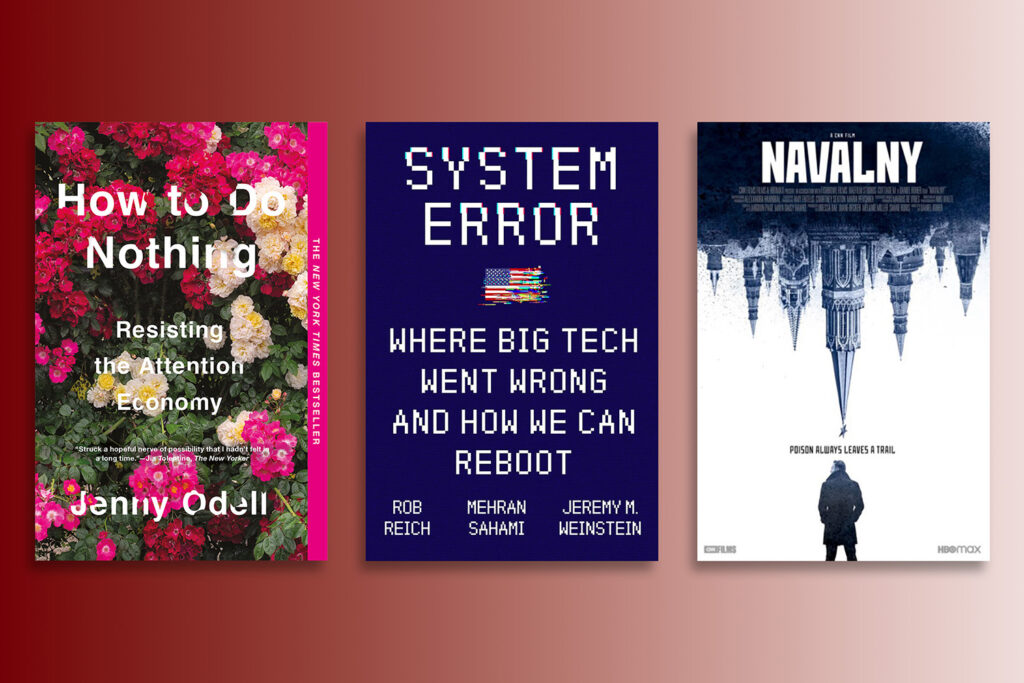Three Books joins the COLLEGE curriculum
Formerly a summer reading program, Three Books will now pair readings or other media with each COLLEGE course.
Stanford’s Three Books program, one of the signature elements of New Student Orientation (NSO), is transitioning into the COLLEGE curriculum.
Since 2004, Stanford has sent newly admitted first-year undergraduate and transfer students three books (sometimes books and other media) to read over the summer. When the students arrive at Stanford for NSO, they discuss the works at special events with the authors.
For the past three years, one of the readings has been incorporated into the syllabus of the fall COLLEGE course Why College? Your Education and the Good Life. Professor Dan Edelstein, the faculty director for Stanford Introductory Studies, which includes COLLEGE, said that the model has proven to be effective.
“Having the book incorporated into a course syllabus meant students were talking about it in class and had higher incentive to read it,” Edelstein said.
He noted that the format enabled more introspective and thoughtful conversations about intellectual matters and resulted in impressive student turnout for the discussion with the author. It will also open space on the packed NSO schedule.
“We thought, why not spread out the three books over the three quarters?” he said.
This year’s selections include two books and one documentary:
How to Do Nothing, by Bay Area artist and writer Jenny Odell, is assigned to the fall COLLEGE course Why College? Your Education and the Good Life. The book explores the ways addictive technology captures users’ attention and how they can choose to use their attention more productively and meaningfully.
System Error: Where Big Tech Went Wrong and How We Can Reboot, by Stanford professors Rob Reich, Mehran Sahami, and Jeremy Weinstein, is assigned to the winter COLLEGE course Citizenship in the 21st Century. The book analyzes how the technology industry’s preoccupation with optimization and efficiency has sacrificed fundamental human values, and then outlines steps to change course.
Navalny, a documentary directed by Daniel Roher, details the 2020 assassination attempt on Russian opposition leader and former Russian presidential candidate Alexei Navalny.
In past years, the vice provost for undergraduate education would ask a faculty member to select the books and moderate the discussions with the authors. That task has now been delegated to the steering committees for each of the three COLLEGE quarters.
“We solicit ideas from a broad spectrum of instructors, then we bring these to the steering committee who has to assess what is a good book for the entire class to read,” Edelstein said.
Historically, the selections each year would coalesce around a particular theme, such as biodiversity, cities, or sustainability. Since the selections must now fit the content of the COLLEGE courses to which they are associated, the three books will no longer share an overarching theme.
Parna Sengupta, associate vice provost and director of Stanford Introductory Studies, said Three Books will retain its name on the course syllabus and at the author events to distinguish the selections from other course materials. The books and their accompanying events will also remain open to all undergraduate first-year and transfer students, not just those who choose to enroll in the COLLEGE courses to which a book is assigned.
“Even though not all frosh will be in any one COLLEGE quarter course, we want to include as many of them every quarter as we can,” Sengupta said.
Three Books has been a distinctive feature of a Stanford undergraduate education for nearly 20 years. With the updated format, the program will continue to engage students intellectually, Edelstein said, but also help them better understand an author’s (or filmmaker’s) creative process.
“Hopefully, this will be an inspiring way to see how ideas grow over time, to be able to ask about the process of producing knowledge through writing or producing a film,” Edelstein said. “It’s that more interactive aspect that’s really unique.”
Sengupta said that incorporating Three Books into COLLEGE will infuse a dynamism into the requirement, since the books will change every year. It will also enhance the opportunity for new students to convene as an academic cohort.
“This is a moment where they all come together, and we hope that they’ll have conversations, not just in their seminars, but in their dorm rooms, and over dinner, etcetera,” she said. “That’s what Three Books was for to begin with – to get them as a class to have a shared intellectual experience.”
COLLEGE – which stands for Civic, Liberal, and Global Education – was launched in 2021 as a new first-year requirement for undergraduates focused on civic responsibility. It is a three-course sequence, with students taking two quarter offerings. The requirement asks students to consider what they want out of a college education, explore ways it can make living worthwhile, and help develop skills to empower them to live in community.
